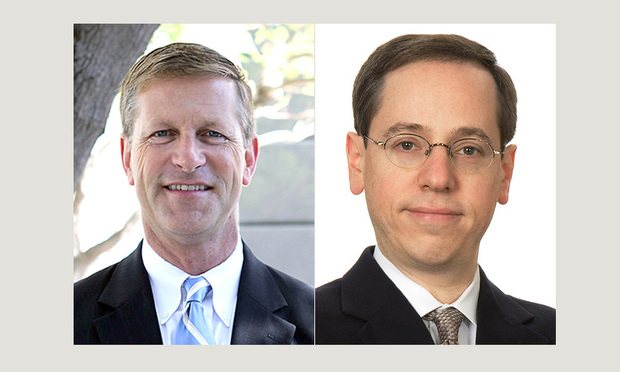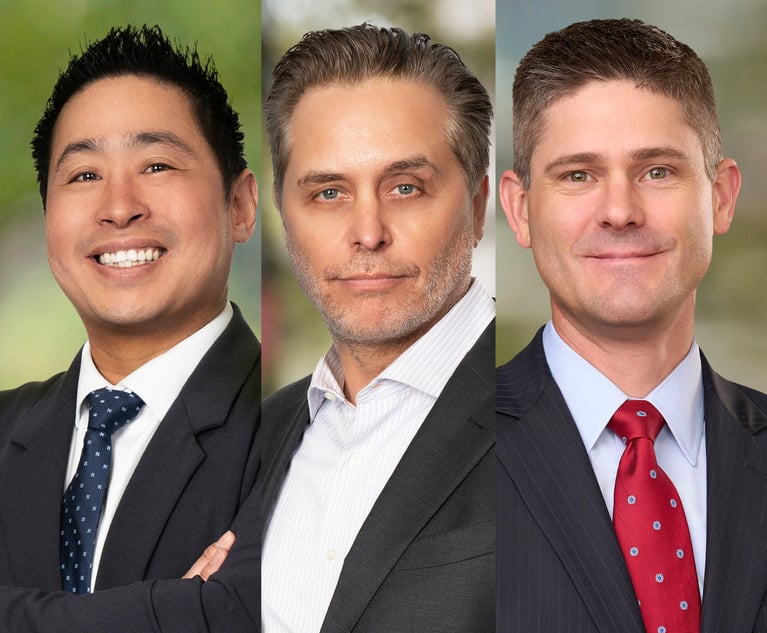Viasat, Acacia Face Off Over Fiber Optics
California's Viasat says it's owed more than $300 million for "theft" of its error correction technology, but Massachusetts' Acacia Communications says Viasat is simply misreading their license agreement.
June 12, 2019 at 02:05 PM
6 minute read
 L-R Kenneth Fitzgerald and Michael Albert.
L-R Kenneth Fitzgerald and Michael Albert.
Maybe it was the placid surroundings of Vista, California. Or perhaps it had more to do with the quietly imposing presence of San Diego Superior Court Judge Timothy Casserly. Whatever the reason, Viasat Inc.'s and Acacia Communications Inc.'s hot-button, high-stakes IP trial got off to a polite start Monday. Four hours of opening statements were completed Monday without a single objection or even so much as a raised voice.
But that doesn't mean Viasat counsel Kenneth Fitzgerald of Fitzgerald Knaier and Michael Albert of Wolf, Greenfield & Sacks didn't have some choice words for their opponents' clients.
“This is a simple case about theft,” said Fitzgerald, who's seeking more than $300 million over contract and trade secret claims. “This is also a case about lying,” he added moments later.
By the end of his presentation he'd shown the jury video of Acacia co-founder Christian Rasmussen dodging sticky deposition questions and had accused the company's chief legal officer of falsely denying that Acacia uses Viasat's proprietary technology in its newest fiber optics products.
Albert, meanwhile, said the case isn't a whodunit about trade secrets, but a simple licensing dispute. “We're not arguing about what Acacia did,” Albert said. “We're arguing about what it was allowed to do.”
He also criticized the chips designed by Viasat as just “a component in a component” and claimed they caused Acacia's transceivers to overheat and nearly catch fire.
The dispute stems from a collaboration 10 years ago in which Massachusetts-based Acacia hired Viasat to help design the chips used in Acacia's 100-gigabit-per-second fiber optic modems. Under the parties' license agreement, Viasat provided confidential coding structure for, among other things, soft decision forward error correction (SDFEC), a method of encoding and decoding packet data to ensure against corrupted transmissions.
All went fine until Acacia began rolling out next-generation products designed for 400- and 1,200-gigabit speeds. Acacia says it designed them without any help from Viasat and therefore isn't paying royalties on them. Viasat alleges the company used confidential information covered by their nondisclosure agreement
Fitzgerald described Monday how Viasat started out as a defense contractor in nearby San Diego and has since branched out to internet infrastructure. SDFEC was developed in the company's Cleveland division and licensed to Acacia in 2009.
By 2013 Acacia executives were trying to figure out how to put out a new generation of transceivers. Fitzgerald displayed an internal email from Acacia founding board member Eric Swanson: “Doesn't backward compatible require us to use Viasat FEC?” wrote Swanson, who stepped down from Acacia's board last week. “That would suck.”
Bhupen Shah, the company's vice president of engineering, described the Viasat license in an email as “a sword over our head” that needed to be removed.
Fitzgerald alleged that Acacia then tried to reverse-engineer Viasat's technology and used its specifications to design its next generation of transceivers and make them backward-compatible. Under the license, “They're not supposed to be looking at the specifications. They're not supposed to be looking at the products.”
Acacia told Viasat it wasn't using its technology. Fitzgerald displayed a 2015 letter from Acacia Chief Legal Officer Janene Asgeirsson telling Viasat it had engineered the new products on its own, without using Viasat's SFDEC or “any variant or derivative thereof.”
That assertion, Fitzgerald said, “is not consistent with the truth.”
In reality, Acacia executives had made much of the Viasat technology available to its engineers, Fitzgerald alleges. Co-founder Rasmussen had forwarded Viasat's SDFEC information from his personal email account. “I don't want to mail it from the company account, just in case silly things should happen down the road,” Rasmussen had written in the email.
Fitzgerald played extended video from Rasmussen's deposition where he was confronted with the email. “I don't know why I sent it from my Yahoo account,” Rasmussen said. “Sitting here reading it, I don't know what it means.”
With these revelations, Acacia's defense has evolved from denying that it was using Viasat's technology. “Now they're claiming they had a license,” Fitzgerald said. But their reading of the license agreement is “a contrivance of the lawyers in this litigation.”
He said Viasat wants $34 million in unpaid royalties, $13 million in late fees, and $288.9 million in damages that he said is “directly attributable” to trade secret misappropriation.
After hearing his client trashed for more than two hours, Wolf Greenfield's Albert sought to humanize Acacia. Holding the transceivers in his hands for jurors to see, he said the company's fiber optic advancements have supercharged internet transmission speeds. “If you want to download Game of Thrones, that's what allows you to do it in ultra-high definition,” he said.
He also emphasized repeatedly that Acacia has continued to pay royalties on sales of its first generation of transceivers, even as in the midst of their litigation.
Viasat's SDFEC technology is nice, “it cleans up the signal a little,” Albert said, but it's essentially “an add on.”
“It was very good for products that went to market in 2009,” he said. But it's not “what drives the value” of Acacia's products.
Acacia had to redesign SDFEC to make its transceivers smaller and more energy efficient. It had to use some of the same “formatting choices” to make the products backward compatible, and used some of the same labels such as “clocks.” That's permitted by the license agreement, Albert said. “Viasat is now trying to change the terms of the deal,” he said.
But Acacia engineers came up with the design for its new SDFEC on their own, so it owes no royalties. “Where was Viasat?” Albert asked. “They were back in Cleveland while Acacia was developing these products.”
Plus, he said, there's no evidence that Viasat considered its designs “trade secrets” until the litigation began, and Acacia certainly didn't share them with anyone else. “You'll hear no evidence that Acacia got any information that Viasat didn't intend to give them,” Albert said.
As for the $300-plus million that Acacia is demanding? That's “twice the profit Acacia has made in its entire history.” He told jurors the licensing contract limits each side's liability to the $13 million Acacia has paid in actual royalties.
This content has been archived. It is available through our partners, LexisNexis® and Bloomberg Law.
To view this content, please continue to their sites.
Not a Lexis Subscriber?
Subscribe Now
Not a Bloomberg Law Subscriber?
Subscribe Now
NOT FOR REPRINT
© 2025 ALM Global, LLC, All Rights Reserved. Request academic re-use from www.copyright.com. All other uses, submit a request to [email protected]. For more information visit Asset & Logo Licensing.
You Might Like
View All

How We Won It: Latham Secures Back-to-Back ITC Patent Wins for California Companies
6 minute read
California Court Denies Apple's Motion to Strike Allegations in Gender Bias Class Action

White & Case KOs Claims Against Voltage LLC in Solar Companies' Trade Dispute
Trending Stories
Who Got The Work
J. Brugh Lower of Gibbons has entered an appearance for industrial equipment supplier Devco Corporation in a pending trademark infringement lawsuit. The suit, accusing the defendant of selling knock-off Graco products, was filed Dec. 18 in New Jersey District Court by Rivkin Radler on behalf of Graco Inc. and Graco Minnesota. The case, assigned to U.S. District Judge Zahid N. Quraishi, is 3:24-cv-11294, Graco Inc. et al v. Devco Corporation.
Who Got The Work
Rebecca Maller-Stein and Kent A. Yalowitz of Arnold & Porter Kaye Scholer have entered their appearances for Hanaco Venture Capital and its executives, Lior Prosor and David Frankel, in a pending securities lawsuit. The action, filed on Dec. 24 in New York Southern District Court by Zell, Aron & Co. on behalf of Goldeneye Advisors, accuses the defendants of negligently and fraudulently managing the plaintiff's $1 million investment. The case, assigned to U.S. District Judge Vernon S. Broderick, is 1:24-cv-09918, Goldeneye Advisors, LLC v. Hanaco Venture Capital, Ltd. et al.
Who Got The Work
Attorneys from A&O Shearman has stepped in as defense counsel for Toronto-Dominion Bank and other defendants in a pending securities class action. The suit, filed Dec. 11 in New York Southern District Court by Bleichmar Fonti & Auld, accuses the defendants of concealing the bank's 'pervasive' deficiencies in regards to its compliance with the Bank Secrecy Act and the quality of its anti-money laundering controls. The case, assigned to U.S. District Judge Arun Subramanian, is 1:24-cv-09445, Gonzalez v. The Toronto-Dominion Bank et al.
Who Got The Work
Crown Castle International, a Pennsylvania company providing shared communications infrastructure, has turned to Luke D. Wolf of Gordon Rees Scully Mansukhani to fend off a pending breach-of-contract lawsuit. The court action, filed Nov. 25 in Michigan Eastern District Court by Hooper Hathaway PC on behalf of The Town Residences LLC, accuses Crown Castle of failing to transfer approximately $30,000 in utility payments from T-Mobile in breach of a roof-top lease and assignment agreement. The case, assigned to U.S. District Judge Susan K. Declercq, is 2:24-cv-13131, The Town Residences LLC v. T-Mobile US, Inc. et al.
Who Got The Work
Wilfred P. Coronato and Daniel M. Schwartz of McCarter & English have stepped in as defense counsel to Electrolux Home Products Inc. in a pending product liability lawsuit. The court action, filed Nov. 26 in New York Eastern District Court by Poulos Lopiccolo PC and Nagel Rice LLP on behalf of David Stern, alleges that the defendant's refrigerators’ drawers and shelving repeatedly break and fall apart within months after purchase. The case, assigned to U.S. District Judge Joan M. Azrack, is 2:24-cv-08204, Stern v. Electrolux Home Products, Inc.
Featured Firms
Law Offices of Gary Martin Hays & Associates, P.C.
(470) 294-1674
Law Offices of Mark E. Salomone
(857) 444-6468
Smith & Hassler
(713) 739-1250






